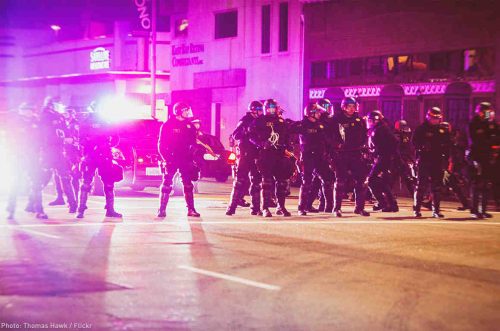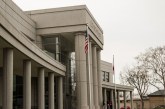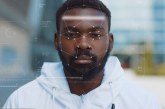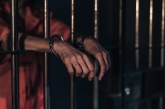 By Thaddeus Talbot
By Thaddeus Talbot
“I think everyone deserves the same rights as I do. I just want peace and justice,” says Maleeha Ahmad, one of the protesters who was pepper-sprayed by police officers in St. Louis last week.
Ms. Ahmad has joined a lawsuit filed by the ACLU of Missouri against the city of St. Louis, arguing that the militarized and overtly aggressive police response to people protesting Jason Stockley’s acquittal violated the protesters’ First Amendment, Fourth Amendment, and due process rights. The ACLU of Missouri also sent a letter to officials in St. Louis reminding them that law enforcement is obligated to refrain from unnecessary and disproportionate use of force against nonviolent protests.
For the past nine days, protesters in St. Louis have decried a Missouri judge’s decision to acquit Stockley, a former St. Louis police officer, of first-degree murder for the shooting death of Anthony Lamar Smith, a 24-year-old Black man. The demonstrations called for justice and an end to the cycle of police brutality that is enabled by court decisions amounting to little more than a slap on the wrist.
What should have been a nonviolent demonstration in St. Louis was sullied by aggression, provocation, and intimidation by St. Louis Police. On the first day of the protests, officers descended on 
demonstrators wearing state-funded riot gear, full-body riot shields, and helmets. They fired tear gas and used pepper spray on dozens of people. They confiscated and destroyed videos of police activity recorded by observers. The videos that did go public showed people being “kettled,” or corralled into small areas, leaving them trapped in the face of an onslaught of chemical agents.
Acting Police Chief Lawrence O’Toole told a room full of reporters that everything happening in the city was being properly managed. ‘’We’re in control,’’ Chief O’Toole said. ‘’This our city and we’re going to protect it.”
And “their” city it was.
Police arrested more than 100 people on the first night of demonstrations, 80 on the second, and even more in the subsequent days. Protesters, press members, and innocent bystanders were rounded up together the same night police smugly chanted, “Whose streets? Our Streets!” An elderly woman was trampled and then arrested during one of the skirmishes.
The St. Louis Metropolitan Police Department has tried to defend its actions by pointing to singular acts of violence committed by a few people. To some, this may seem like a sufficient justification. Dispersing large crowds ensures everyone’s safety, right? Wrong.
Although police are authorized to issue dispersal orders for unlawful assemblies, law enforcement officials in St. Louis used their power indiscriminately, without making clear when and where those orders applied. As a result, people engaged in a lawful protest — along with observers and members of the press — were trapped and subjected to these violent tactics without the opportunity to disperse.
Further, isolated incidents of confrontation, even violent confrontation, should never be used as a proxy for the legality of an entire political demonstration. If police officers are given carte blanche authority to stamp out protests as soon as someone throws a rock or smashes a store window, then the state will always have an excuse to squelch the constitutionally protected speech of peaceful demonstrators.
Indeed, the First Amendment prohibits this broad-brush approach to state-sanctioned censorship. The Supreme Court decided in NAACP v. Clairborne Hardware Co. that the state cannot declare an entire political demonstration illegal simply because a handful of actors engage in violent conduct. By retaliating against lawful protests with militarized force, without any warning, police impinge on the due process rights of protesters.
We should also be careful not to let police serve as the ultimate arbiters of a demonstration’s legality. Like other institutions in American society, police are vulnerable to implicit biases, rooted in Reconstruction-era theories of Black criminality, that paint protesters of color and the demonstrations they lead as inherently aggressive, dangerous, and fraught. These biases impact the First Amendment rights of protesters to this day.
Like Maleeha Ahmad, Missouri is in need of peace. Only three years ago, the “Show-Me” state was rocked by the death of 18-year-old Michael Brown. If Missouri is to heal, it must start by listening to protesters instead of attacking them. That is the first step down a long road towards ending the continued oppression and injustice Black and brown people face at the hands of law enforcement.
Thaddeus Talbot is a joint Legal Administrative Assistant with the ACLU’s Speech, Privacy and Technology Project and the Human Rights Program.






““Whose streets? Our Streets!”
This chant, coming from police, whose jobs, provided by the taxpayers, are to serve and protect the community, is as chilling to me as the spectacle of Nazi’s marching in the streets chanting “White Sharia now” and “Heil Trump”. It smacks of undeclared martial law What is due here is not defensive of these actions, but rather a full investigation of how any police force has gotten to the point where they believe that the streets are their property and not that of the citizens they are paid to protect.
Yeah, both sides should tone down the rhetoric. Shouts of “hands up, don’t shoot” which turned out to be a lie and BLM chants of “PIGS IN A BLANKET, FRY EM LIKE BACON” do little for mutual discourse.
This both sides stuff needs to stop. There is a color of authority issue that makes the offense assymetrical.
So when a protest turns into a riot with thugs looting, damaging property, injuring cops and starting fires the cops should back down?
No, the police should act within their authority not transcend it or escalate it which is what seems to have happened.
How many cops actually did the chant? Do you even know? Was this just a couple of cops and the press decided to run with the story?
It’s not clear how many chanted it – does it matter and if so, why?
Yes it matters, if only one or two chanted it you chalk it up to a couple of bad apples. It’s not the dept. policy. You liberals always do this, you take some isolated incident that maybe a few dummies did and try and make a federal incident out of it. Kind of like “mowing while black” that you have to have written about @ 20 times on your blog even though it happened near a decade ago. I was stopped by the cops in Davis “walking in the park while white” and I don’t remember reading about that on here.
I disagree with you on this. First of all, I disagree with bad apple theories because it ignores the problem of failure to report. Second, if you look at the your initial comment it was inappropriate behavior on both sides, which I objected to because the inappropriate behavior on the part of officers whether it was two or all of them occurred under the color of authority. You’ve tried (without eviden ce actually – as you don’t know how many it was either) to diminish that point, but have not addressed it in any way head on. Are the behaviors equivalent? I would argue that we have to hold police to a higher standard than protesters. You disagree?
If you say so
Actually it doesn’t, and it won’t.
Of course except when it’s your buddies on the receiving end.